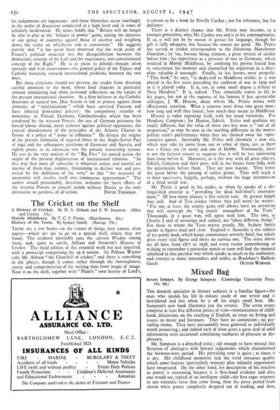The Cricket on the Shelf
Mainly Middlesex. By T. C. F. Prittie. (Hutchinson. 16s.) History of the Tests. By Sydney Smith. (Harrap. 15s.)
THERE are a few books—in the rature of things they cannot often appear—which are apt to go on a special shelf, where they are handy. The cricketer inevitably puts the current Wisden among them, and, quite as surely, Altham and Swanton's History of Cricket. The third edition of this essential work has just appeared, with a postscript compassing the 19 6 season. Sir Pelham Warner calls Mr. Altham " the Churchill of cricket," and there is something in the phrase, though it comes rather through the thoroughness, clarity and comprehension of his writing than from magic of image. Near it on the shelf, together with " Plum's " own history of Lord's,
is certain to be a book by Neville Cardus ; not for reference, but for dalliance.
There is a distinct chance that Mr. Prittie may become, to a younger generation, what Mr. Cardus was and is to his contemporaries. If so, it will not be by reason of genius for language, though his gift is fully adequate, but because the omens are good. Mr. Prittie has served as cricket correspondent to the illustrious Manchester Guardian ; he has, fortune being clement, a great stretch of cricket before him ; his experience as a prisoner of war in Germany, which resulted in Mainly Middlesex, by confining his person forced him to concentrate his memory and channelled his aspiration in a disci- pline valuable if unsought. Finally, he has heroes, most properly. " This book," he says, " is dedicated to Middlesex cricket as it was played in the five years preceding the outbreak of war in 1939 and as it is played today. It is, too, in some small degree a tribute to Patsy Hendren." It is, indeed. That inimitable comes to life in his pages, but not at the expense of his famous if less spectacular colleague, J. W. Hearne, about whom Mr. Prittie writes with affectionate attention. What a contrast were those two great men ; how long and well they lasted ; how much they meant to Middlesex.
History is today repeating itself, with her usual variations. For Hendren, Compton ; for Hearne, Edrich. Styles and qualities are totally different, but the value of these two key men is " out of all proportion," as may be seen in the startling difference in the metro- politan team's -performance when they are claimed away for repre- sentative games. Inevitably Mr. Prittie will chronicle a new era, which may take its name from one or other of them, just as there was a Grace era (or aeon) and one of Hobbs. Fortunately, there is not the faintest reason to suppose that it will be less interesting than those before it. Moreover, as is the way with all great players, Edrich, Compton and their peer, will in the future form links with the generations before them. They are now mature. They learnt the game before the passing of earlier giants. They will teach it to their successors, happily, perhaps, without the huge intermission of a third world war.
Mr. Prittie is good in his asides, as when he speaks of a dis- tinguished amateur as "providing the ideal half-hour's entertain- ment." Of how many players is this strictly true. At greater length they pall. And of Test cricket (where they pall most) he writes: " For me, at least, the county game will always have an attraction that will outweigh the `big match' atmosphere of the Tests." Thousands, in a quiet way, will agree with him.. The two, as Charles I said of sovereign and subject, are "clean different things." For those to whom the Tests matter greatly, Mr. Sydney Smith speaks in figures loud and clear. England v. Australia is the subject of his portly book, which keeps commentary severely brief, but which gives every vital figure and omits no curious one. The score sheets are all here, from 1877 to 1938, and every reader remembering or wishing to remember a particular match or team will find the material tabulated in that peculiar way which speaks as much to the enthusiast, and conveys as many innuendoes and asides, as Bradshaw's Railway


































 Previous page
Previous page